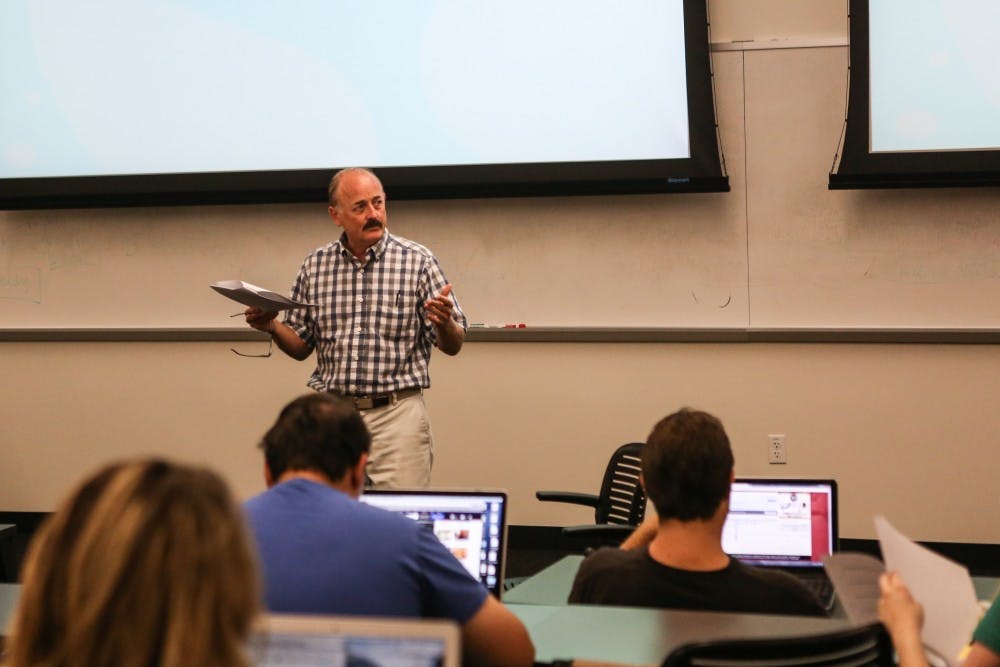 David Demers lectures during his JMC 402 Mass Com Law class at Cronkite. His recent court case on the First Amendment rights has been used for law lectures. (Photo by Arianna Grainey)
David Demers lectures during his JMC 402 Mass Com Law class at Cronkite. His recent court case on the First Amendment rights has been used for law lectures. (Photo by Arianna Grainey)
Correction added.
An instructor’s fight for freedom of speech prevailed, as a verdict by the Ninth Circuit Court of Appeals reversed the decision by a district court that ruled professors are not protected under the First Amendment.
David Demers, an adjunct professor at the Walter Cronkite School of Journalism and Mass Communication, sued four administrators at Washington State University for what he called retaliation against him after he published a pamphlet and drafts for a book in progress.
The pamphlet, titled “The 7-Step Plan,” suggested changes for the Edward R. Murrow College of Communication at WSU, where Demers was a tenured professor. His ideas included a plan to obtain national accreditation for the school.
He offered to donate $100,000 of his own money to help implement the program, if it was accepted. Demers said the school didn't like his plan.
"All of a sudden, I went from one of the highest-rated faculty members in the department to the worst," Demers said.
According to court documents, Demers explained in court the administration gave him negative performance ratings he did not deserve and entered a formal notice of discipline.
In 2010, Demers filed a lawsuit against four administrators, two from the Murrow school and two from WSU’s provost’s office.
His lawyer, Judith Endejan, is a First Amendment attorney for Graham and Dunn PC in Seattle.
The case never made it to trial, however. The state attorney representing the four defendants filed a motion asking the judge to throw out the case, because professors are not entitled to free speech rights.
"That was one thing that just stunned me," Demers said. "I could not believe that they were actually asking the judge that. It just seemed to go against all the principles and ideas that Murrow stood for."
The district judge dropped the case, following the precedent set by Garcetti v. Ceballos. In that case, a court ruled that government employees do not have freedom of speech rights while performing official duties.
Demers and Endejan filed an appeal, and in November 2012, they spoke before a panel of judges representing the Ninth Circuit Court of Appeals, which resides over much of the western part of the U.S.
“When we left that hearing, I was 99 percent sure I was going to lose,” Demers said.
According to the opinion written by Judge William Fletcher of the Ninth Circuit Court of Appeals, WSU argued Demers did deserve the poor performance rankings.
WSU argued in court that there were rightful reasons for Demer's negative reviews, saying he failed to perform his share of university duties, Judge Fletcher wrote in his opinion.
On Sept. 5, the circuit court handed down its decision, saying his pamphlet was protected by the First Amendment, thus reversing the decision in the district court.
The circuit court declared the case is actually governed by Pickering v. Board of Education, which held teachers have the right to speak out on issues if they address matters of public concern.
“We conclude that Garcetti does not — indeed, consistent with the First Amendment, cannot — apply to teaching and academic writing that are performed ‘pursuant to the official duties’ of a teacher and professor,” Judge Fletcher wrote in the opinion.
This case only applies to the ninth circuit, whose jurisdiction resides over Alaska, Arizona, California, Hawaii, Idaho, Montana, Nevada, Oregon and Washington. One other circuit court has made a similar decision, Endejan said. Two circuit courts have ruled not to protect academic speech.
The case has a huge effect on public teachers and administrators, who now have the right to talk about academic matters of concern for their institution without administration retaliation, Endejan said.
“The essence of education and democracy is the ability to speak and think freely without repercussion for unpopular views,” she said.
WSU can appeal the decision back to the circuit court or to the U.S. Supreme Court.
WSU spokeswoman Kathy Barnard said in an email statement that the court's opinion on the case speaks for itself.
“It is important to note that nowhere in the opinion are WSU employees or administration accused of any wrongdoing,” she said.
Demers left WSU in December 2012 to spend more time promoting civil liberties and writing. In 2012, he created a nonprofit organization called the American Center for Civil Liberties with a goal to distribute information to the public and university scholars.
He now teaches a media law course at the Cronkite School.
“I’ve been fighting for free speech issues all my life, and sometimes you win, and sometimes you lose," he said. "It’s not about winning. It’s about fighting for what you believe in that’s most important."
Reach the reporter at savannah.harrelson@asu.edu or follow her on Twitter @savannahleeh
Correction: This article has been updated to reflect David Demers's correct position as an adjunct professor at the Walter Cronkite School of Journalism and Mass Communication.




